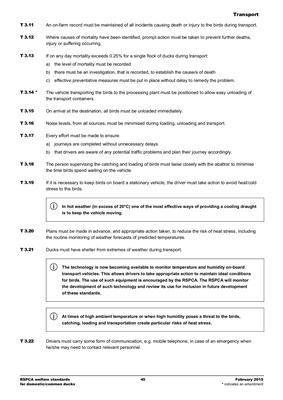
Transport
RSPCA welfare standards
for domestic/common ducks
45 February 2015
* indicates an amendment
T 3.11 An on-farm record must be maintained of all incidents causing death or injury to the birds during transport.
T 3.12 Where causes of mortality have been identified, prompt action must be taken to prevent further deaths,
injury or suffering occurring.
T 3.13 If on any day mortality exceeds 0.25% for a single flock of ducks during transport:
a) the level of mortality must be recorded
b) there must be an investigation, that is recorded, to establish the cause/s of death
c) effective preventative measures must be put in place without delay to remedy the problem.
T 3.14 * The vehicle transporting the birds to the processing plant must be positioned to allow easy unloading of
the transport containers.
T 3.15 On arrival at the destination, all birds must be unloaded immediately.
T 3.16 Noise levels, from all sources, must be minimised during loading, unloading and transport.
T 3.17 Every effort must be made to ensure:
a) journeys are completed without unnecessary delays
b) that drivers are aware of any potential traffic problems and plan their journey accordingly.
T 3.18 The person supervising the catching and loading of birds must liaise closely with the abattoir to minimise
the time birds spend waiting on the vehicle.
T 3.19 If it is necessary to keep birds on board a stationary vehicle, the driver must take action to avoid heat/cold
stress to the birds.
In hot weather (in excess of 20°C) one of the most effective ways of providing a cooling draught
is to keep the vehicle moving.
T 3.20 Plans must be made in advance, and appropriate action taken, to reduce the risk of heat stress, including
the routine monitoring of weather forecasts of predicted temperatures.
T 3.21 Ducks must have shelter from extremes of weather during transport.
The technology is now becoming available to monitor temperature and humidity on-board
transport vehicles. This allows drivers to take appropriate action to maintain ideal conditions
for birds. The use of such equipment is encouraged by the RSPCA. The RSPCA will monitor
the development of such technology and review its use for inclusion in future development
of these standards.
At times of high ambient temperature or when high humidity poses a threat to the birds,
catching, loading and transportation create particular risks of heat stress.
T 3.22 Drivers must carry some form of communication, e.g. mobile telephone, in case of an emergency when
he/she may need to contact relevant personnel.